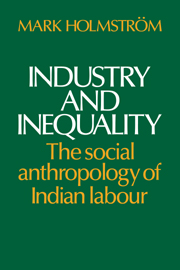Summary
This book is an attempt to develop an anthropology of industrial work in India, and an anthropological approach to a problem, the economic ‘dualism’ which is said to be characteristic of India and other industrializing countries.
Thus Robert MacNamara, President of the World Bank, said of the cities in developing countries:
Economic dualism is widespread. Two sectors coexist side by side. One is the organized, modern, formal sector, characterized by capital-intensive technology, relatively high wages, large-scale operations, and corporate or governmental organization.
The other is the unorganized, traditional, informal sector – economic units with the reverse characteristics: labour-intensive, small-scale operations, using traditional methods, and providing modest earnings to the individual or family owner.
In the modern sector, wages are usually protected by labour legislation and trade union activity; in the informal sector, there is easier entry, but less job security and lower earnings.
(MacNamara 1975:21)This implies there are two classes of people very differently placed: a lucky minority working in the protected modern, sector, and the majority outside it.
Certainly one's first impressions of a city like Bombay bear this out. There seems to be an obvious contrast between the modern sector of factories, offices and large business houses, and the labour-intensive unregulated small firms which offer a living but little security to many of the urban poor.
What are the real differences and relations between these two kinds of Indian workers?
- Type
- Chapter
- Information
- Industry and InequalityThe Social Anthropology of Indian Labour, pp. 1 - 25Publisher: Cambridge University PressPrint publication year: 1984

